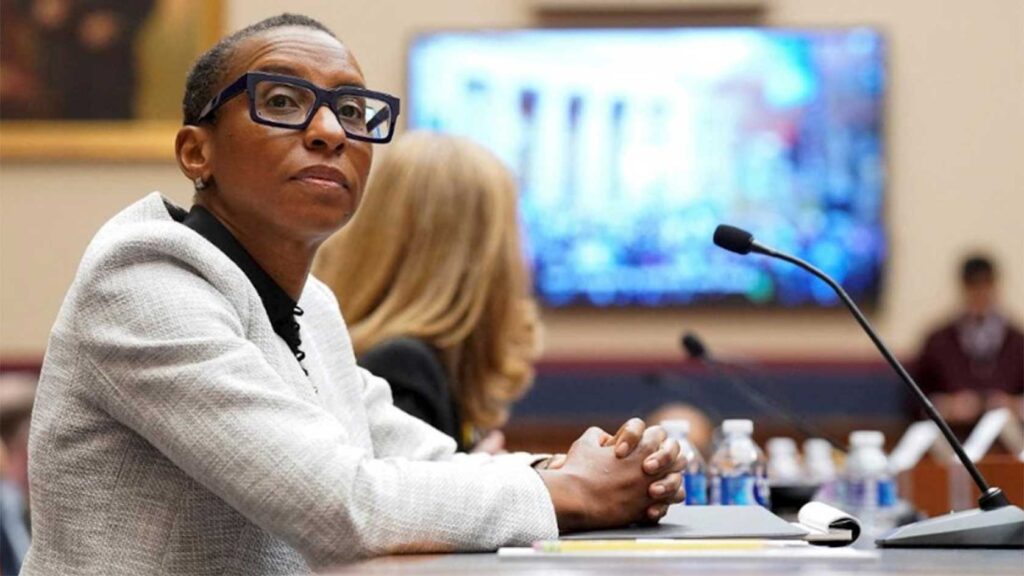Scholars fear Claudine Gay resignation may impact women of color in academia

For Prudence Carter, a professor of sociology at Brown University, Claudine Gay’s resignation as president of Harvard University felt like “another moment of collective trauma.”
“You don’t know when there will be another window of opportunity,” she said. “We have been so excluded and we have to be so much more accomplished, to even be considered for these jobs. [There’re] so few of us Black women in these positions as full professors, as deans, and even as the presidents … and so it felt personal.”
Before she came to Brown, Carter, who was the 2022-23 president of the American Sociology Association, served as a dean at the University of California, Berkeley, and was a professor at Stanford University and Harvard — positions held by few women and people of color.
In 2022, women of color accounted for just 13% of college presidents, while white women accounted for 26.5%, according to a report by the American Council on Education, a higher education advocacy nonprofit.
Among Black women, the numbers are even lower. Only 5.4% of college presidents in 2022 were Black or African American women, according to the same report, based on survey responses from more than 1,000 presidents. Nearly 3 in 4 were white.
At Harvard, the number of tenured professors who are women of color was 7% last fall, an increase of just 3 percentage points in 10 years.
Carter said this lack of representation does both “educational and symbolic harm” to Black students who might miss out on having role models who look like them in leadership positions.
She said she recognizes that Gay made mistakes. Gay, who resigned amid mounting pressure regarding her congressional testimony about antisemitism on campus and allegations of plagiarism, acknowledged her missteps in a New York Times op-ed.
“In my initial response to the atrocities of Oct. 7, I should have stated more forcefully what all people of good conscience know: Hamas is a terrorist organization that seeks to eradicate the Jewish state,” Gay wrote. “And at a congressional hearing last month, I fell into a well-laid trap.”
But Carter said Gay’s resignation signals a larger issue.
“She was emblematic of all the things that [conservatives] can’t stand and tolerate when it comes to thinking about [what] ‘diversity, equity and inclusion’ signifies,” she said.
Gay’s decision to resign triggered a surge of outrage and reflections from Black women across the spectrum, many of whom saw her thrust from the pinnacle at Harvard as an attack on women of color by right-wing forces opposed to diversity.
Congresswoman Ayanna Pressley said Gay was a pillar of grace “in the face of this coordinated, political and racially motivated attack.”
In an email to the Banner, Pressley wrote, “I strongly condemn antisemitism and hate in all its forms wherever they exist. But the coordinated attack on President Claudine Gay was never in good faith. It was always part of Republicans’ national strategy to attack Black leadership, undermine faith in our institutions of higher learning and further weaken our democracy.”
Janie Victoria Ward, a Simmons University professor in the department of critical race, gender and cultural studies, said she is concerned about the implications of Gay’s resignation for Black people in academia.
“I worry about the message that it conveys to Black girls and young Black women, younger Black scholars and future educational leaders,” she said. “And that is that the message says, ‘You don’t belong. We don’t want you to lead us,’ and that ‘We don’t care how hard you work.’”
She said it is beneficial for students to have professors from diverse backgrounds and for institutions such as Harvard to have women of color in decision-making roles where they are “often in a position to make life better for students” by selecting “who it is that we let through the door, and why.”
“Administrators are extraordinarily important, and administrators of color can do a lot to help to pave the way for students to get through universities,” she said.
Leslie D. Gonzales, head of the educational policy studies and practices department and director of the Center for the Study of Higher Education at the University of Arizona, said Gay’s resignation would “continue to make women of color pause and not … see themselves in these leadership roles.” She said this would be detrimental.
“There’s such a wealth of empirical research conducted in different ways — quantitative studies, qualitative studies, observational studies — work that shows that that diversity in experiences yields diversity in thoughts, yields diversity in strategies …. That’s good for our higher education institutions,” said Gonzales, whose research interrogates how underrepresented scholars advance in the academic evaluation system.
Carter, the Brown professor, said the circumstances around Gay’s resignation were a “global flogging,” one that would shift the expectations of all Black women in higher education leadership positions.
“I worry that if any organizations or institutions entertain appointing to the helm a Black woman,” she said, “that they’re going to do even more dictating or require us to be even more superheroines than we already have to be.”






